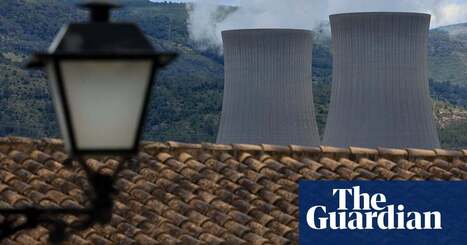 Your new post is loading...
 Your new post is loading...

|
Scooped by
Graham Watson
June 19, 10:09 AM
|
Environmental group says adding levies to airline tickets would help ease financial burden on poor countries

|
Scooped by
Graham Watson
June 19, 3:04 AM
|
Nippon agreed to give a "golden share" to the US government to win approval of the takeover.

|
Scooped by
Graham Watson
June 13, 11:50 AM
|
Baldío in Mexico City is part of a new wave of restaurants embracing a regenerative ethos – with delicious results

|
Scooped by
Graham Watson
June 11, 1:38 PM
|
CMA to decide whether deal will substantially lessen competition in delivery market

|
Scooped by
Graham Watson
June 10, 2:07 AM
|
The media giant will separate its studio and streaming business away from its cable TV networks.

|
Scooped by
Graham Watson
June 9, 3:31 AM
|
Exclusive: Common Wealth report argues debt, pollution and underinvestment justify process known as special administration

|
Scooped by
Graham Watson
June 6, 1:44 AM
|
Firms including Thames Water have been stopped for paying rewards to executives under new rules.

|
Scooped by
Graham Watson
June 3, 3:28 PM
|
Partha Dasgupta’s landmark study provided way to put a value on nature – but many fear report has been sidelined

|
Scooped by
Graham Watson
June 2, 2:55 AM
|
Spain’s recent blackout and AI datacentres’ energy needs are leading politicians to reach for the restart button

|
Scooped by
Graham Watson
May 30, 6:06 AM
|
Up to 500,000 more plug-in hybrids could be sold because of government flexibility on the zero-emission mandate

|
Scooped by
Graham Watson
May 30, 5:31 AM
|
Watchdog says fines reflect ‘potentially serious risk to the public’ because of missed callout targets

|
Scooped by
Graham Watson
May 29, 2:09 AM
|
Plans to build costly DRI plant in Britain to make green steel is seen by some as the future and others as a ‘white elephant’

|
Scooped by
Graham Watson
May 29, 1:41 AM
|
The rule requiring planning permission if a heat pump is within 1m of a neighbours property has been removed.
|

|
Scooped by
Graham Watson
June 19, 3:13 AM
|
Algorithm’s launch coincided with company taking bigger cut from fares and raising trip prices, researchers say

|
Scooped by
Graham Watson
June 16, 4:13 AM
|
High Pay Centre thinktank says median pay of FTSE 350 chief executive was £2.4m in 2023-24 financial year

|
Scooped by
Graham Watson
June 11, 2:06 PM
|
Taxes now account for $28 of the average $40 price for a packet, following a triple-fold excise hike in 10 years from 46c to $1.40 per cigarette

|
Scooped by
Graham Watson
June 11, 9:57 AM
|
TalkTalk has been hit by financial difficulties and customer exodus but it is thought no approach has been made

|
Scooped by
Graham Watson
June 9, 4:05 PM
|
Chair of troubled firm admits 21 senior managers were paid 50% of base salary on 30 April

|
Scooped by
Graham Watson
June 7, 5:37 AM
|
The energy secretary says the move will cut energy bills, but house builders caution against burdensome regulations.

|
Scooped by
Graham Watson
June 4, 1:57 AM
|
Editorial: A new ‘guiding mind’ for the industry will end the fragmentation that came with privatisation. But the public will want to see cheaper tickets too

|
Scooped by
Graham Watson
June 3, 8:55 AM
|
The setback increases the possibility that the company will collapse into a government-supervised administration.

|
Scooped by
Graham Watson
May 31, 5:06 AM
|
Michael O’Leary is set to earn a bonus worth more than €100m (£84m) after clearing a key performance target.

|
Scooped by
Graham Watson
May 30, 6:03 AM
|
More than 60,000 workers have received back pay worth £7.4m from 518 employers after HMRC investigations

|
Scooped by
Graham Watson
May 29, 2:16 AM
|
If fares don’t fall and services don’t improve, it could undermine the case for public ownership for a long time to come, says Sarah Nankivell of Common Wealth

|
Scooped by
Graham Watson
May 29, 2:02 AM
|
Big brands retaining high prices and government yet to publish response to CMA investigation into infant milk
|






 Your new post is loading...
Your new post is loading...






























I'm struggling to post this Guardian piece on the potential struggles facing Thames Water in recruiting its executives. I kid you not, but the firm has told OFWAT that its plans to limit bonus payments to its executives will starve it of 'talent'. As a result, they might seek to increase base pay "to compensate for the loss of performance-related pay plans”.
There are all sorts of ways that you might use this article as a starter, not least in asking what determines the pay of people in a given profession, before moving on to consider whether water company executives are in danger of being under-paid or not.
Thames Water might also want to give me a call - depending upon whether or not I'd be willing to accept the Chief Executive, Chris Weston's current £850,000 salary, with a performance-related bonus that could see him earning £2.25m over the year. (For reference purposes, it would see Mr. Weston take home in a year, more than I'm likely to earn in my entire career!)